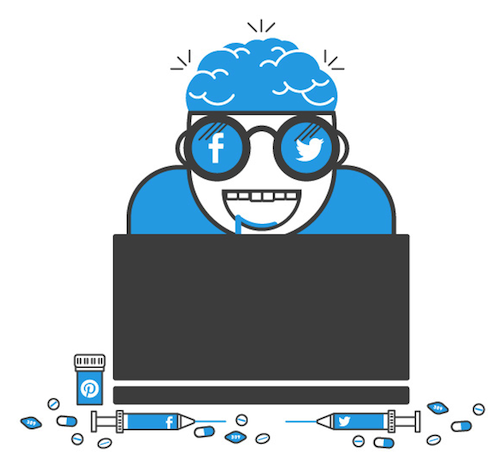“I am using FaceBook for chatting only, I am not addicted to
it”, a conflictive sentence by a friend who was sticking her eyes in front of
her mobile phones from the start of a group conversation. You should have been
in that situation at least one time when everyone is talking except a person
who keeps using social media during the period? In fact, most of the time
talking to friends in university, they never actually talk to each other. Every
effort in opening a conversation is killed because everyone is chatting with
other, liking and uploading status on Facebook or Instagram. It is awkward to
see how many young people today socializing on FaceBook more than in real life.
3.1 hours is average hours of using social media by
Vietnamese people according to Chabrol
in 2015. Of course, this is just an average, there are still many
Vietnamese individuals spend the rest of their free-time surfing FaceBook and
other social media platforms. In UK, a statistic shows that 26% of people
prefer communicate with friends through online or device than face-to-face
method according to Daily
Mail in 2010. Another research
conducted by Yazino and Opinium also shows that 11% of people prefer
staying at home and using social media rather than meeting their friends on
weekend. You can see clearly that people now are wasting their time socializing
on social media instead of socializing in real life. It is because social media
provides people the sense of belongingness, more entertaining activities, and a
more comfortable chance to show their own identities. This idea is supported by
Cohen
in 2015 that the main reasons that people prefer using FaceBook, Instagram
or other social media platforms: the sense of being close to their friends and
family, keeping track with latest news
and events, keeping them busy, entertaining, and to reveal their own identities
and opnions.
How can we stop being addicted to social media? After
talking with some friends about the negative effects of social media, showing
them the some videos about those effects (Example: Video 1, Video 2, etc), one had
limited using FaceBook the next day, the others continued. That guy obviously
experienced cognitive dissonance in a highest level and had to reduce it
immediately by limiting the frequency . In fact a lot of people have
experienced the same feeling with that guy when they recognise the negative
effects and dissonance-arousing materials. So, how can cognitive dissonance be
used to stop social media addiction?
A little bit
information about cognitive dissonance, it is defined by Festinger in
1957 as a psychological discomfortable feeling aroused when there is an
inconsistent pair of cognition, belief, behavior or attitude. When people
experience cognitive dissonance, they try to reduce it by giving
rationalizations, the excuses, or reject the offensive contents. However if the
cognitive dissonance reaches the highest level, people tend to change their
belief, attitude or behavior or simply quit doing it in order to feel
comfortable. A study of
Johnson in 1968 illustrates that if a person endorse fewer or reject
rationalizations of addict, they tend to quit or never become addict. Just like
the above guy who reaches the highest level of cognitive dissonance when he
watches the video, he limits the time using FaceBook and nearly quits using it.
He has rejected all the rationalizations of social media addicts to feel
comfortable. If you do not reject rationalizations of addicts and put efforts
in quitting it, you obviously cannot stop addicting to social media, or
anything else, just like David Schneider in this article “Is
being addicted to social media such bad thing?”. He admits he is still
addicted to social media because he has not put his effort in quitting it and
still endorse excuses of addicts.
To conclude, social media addiction has caused many problems
with adults today. We are not socializing with each other, we are isolating
ourselves from the society. Therefore, to stop the addiction, we should raise
the level of dissonance to the highest level by watching, reading or listening
dissonance-aroused materials, then put effort to stop doing it. Moreover, we
must reject all rationalizations of the social media addicts to concentrate on
treat ourselves for this addiction.


No comments:
Post a Comment